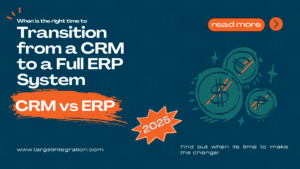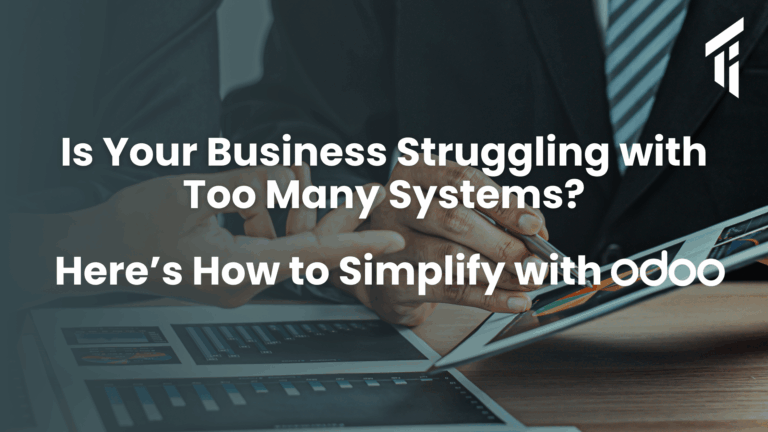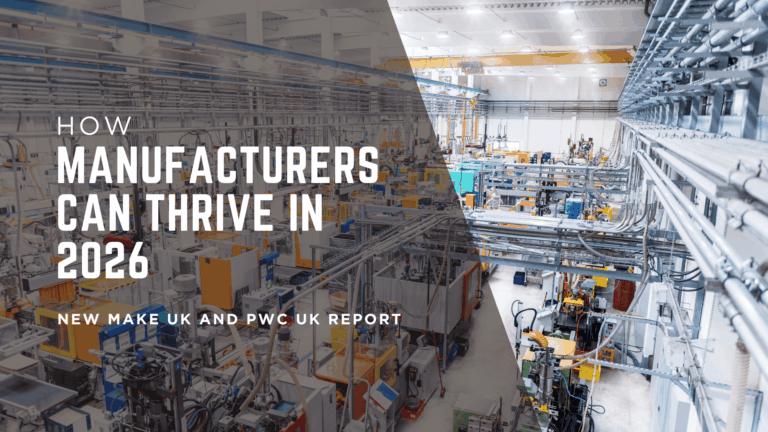For growing businesses, customer relationship management (CRM) software is often the first step towards digital transformation. However, as your organisation expands and operations become more complex, you may find your CRM simply isn’t enough anymore.
The question becomes: when is the right time to make the leap from a CRM to a comprehensive Enterprise Resource Planning (ERP) system?
Understanding the Difference
Before diving into timing, it’s crucial to understand what sets these systems apart. A CRM focuses primarily on managing customer interactions, sales pipelines, and marketing campaigns. An ERP, on the other hand, is an integrated platform that manages your entire business operation—from finance and inventory to human resources, supply chain, and yes, customer relationships.
Think of a CRM as a specialist tool, whilst an ERP is your complete business management suite.
Signs It’s Time to Make the Change
1. You’re Managing Multiple Disconnected Systems
If your team is juggling separate software for accounting, inventory management, purchasing, and customer relations, it’s a clear signal that you’ve outgrown a standalone CRM. When employees spend valuable time manually transferring data between systems or reconciling information across platforms, inefficiency has become a costly reality.
2. Your Business Has Expanded Beyond Sales and Marketing
As your business grows, so do your operational complexities. If you’re now managing inventory, multiple locations, manufacturing processes, or complex supply chains, a CRM alone cannot provide the comprehensive oversight you need. An ERP system brings all these functions under one roof.
3. Financial Visibility Is Becoming Critical
When stakeholders and management require real-time financial insights, consolidated reporting, and accurate forecasting across all departments, your CRM’s limited financial capabilities will fall short. ERP systems offer robust financial management with multi-currency support, automated compliance, and detailed analytics.
4. You’re Experiencing Data Silos
If different departments are working with their own data sets that don’t communicate with each other, you’re losing the opportunity for informed, data-driven decision-making. Data silos lead to inconsistencies, errors, and missed opportunities.
5. Scalability Concerns Are Emerging
Perhaps the most telling sign: your current systems are struggling to keep pace with your growth trajectory. If you’re planning significant expansion, entering new markets, or scaling operations, implementing an ERP now will support that growth rather than hinder it.
The Compelling Advantages of Full ERP Systems
Unified Data and Single Source of Truth
An ERP system eliminates data duplication and inconsistency by maintaining one centralised database. Every department works from the same information, updated in real-time. This means sales, finance, operations, and management all see the same numbers, reducing errors and disputes.
Enhanced Operational Efficiency
Automation is at the heart of ERP systems. From purchase orders that automatically trigger when inventory reaches certain levels to invoices that generate immediately after order fulfilment, ERP systems streamline processes that would otherwise consume hours of manual work.
Comprehensive Business Intelligence
ERP systems provide powerful reporting and analytics across every aspect of your business. You can track key performance indicators, identify trends, forecast demand, and make strategic decisions based on comprehensive data rather than fragmented insights.
Improved Compliance and Risk Management
With built-in compliance features, audit trails, and standardised processes, ERP systems help ensure your business meets regulatory requirements. This is particularly valuable for businesses in heavily regulated industries or those operating across multiple jurisdictions.
Better Customer Experience
Whilst CRMs excel at managing customer relationships, ERPs enhance the entire customer journey. When your inventory, order processing, shipping, and billing systems are integrated, customers benefit from accurate delivery promises, faster order fulfilment, and fewer errors.
Scalability for Future Growth
ERP systems are designed to grow with your business. Whether you’re adding new product lines, opening additional locations, or expanding internationally, your ERP infrastructure can accommodate these changes without requiring a complete system overhaul.
Cost Efficiency Over Time
Though the initial investment in an ERP system is typically higher than a CRM, the long-term cost benefits are substantial. You’ll reduce spending on multiple software subscriptions, decrease labour costs through automation, and minimise costly errors that result from disconnected systems.
Making the Transition: What to Consider
Timing Your Implementation
The ideal time to implement an ERP system is during a relatively stable business period—not in the midst of a merger, major product launch, or peak season. Allow adequate time for planning, data migration, and staff training.
Staff Readiness
Your team needs to be prepared for change. An ERP implementation affects every department, so securing buy-in from all levels of your organisation is essential. Training and ongoing support will determine whether your investment succeeds or struggles.
Choosing the Right ERP Solution
Not all ERP systems are created equal. Consider industry-specific solutions that address your unique challenges. Cloud-based ERPs offer flexibility and lower upfront costs, whilst on-premise solutions provide greater control over data.
The AI Advantage: Supercharging Your ERP Investment
Today’s leading ERP systems are increasingly incorporating artificial intelligence and machine learning capabilities that can transform your business operations even further. AI can predict demand patterns, optimise inventory levels, identify potential supply chain disruptions before they occur, and provide intelligent insights that help you stay ahead of the competition.
From automated data entry and smart process recommendations to predictive analytics and natural language processing, AI is making ERP systems more intuitive, powerful, and valuable than ever before.
Ready to Transform Your Business?
Transitioning from a CRM to a full ERP system is a significant decision that can fundamentally transform how your business operates. If you’re experiencing any of the signs mentioned above, now may be the perfect time to explore your options.
Don’t navigate this journey alone. Our experienced consultants specialise in helping businesses like yours evaluate their needs, select the right ERP solution, and implement systems that drive real results. We can also show you how AI-powered features can maximise your ERP investment and give you a competitive edge in your industry.
Book a complimentary consultation today to discuss your specific challenges and discover how a modern ERP system—enhanced with AI capabilities—can streamline your operations, improve decision-making, and support your growth ambitions.
Contact us to schedule your consultation and take the first step towards a more integrated, efficient, and intelligent business operation.




